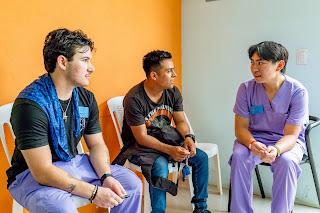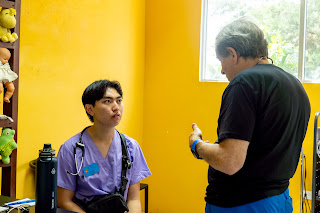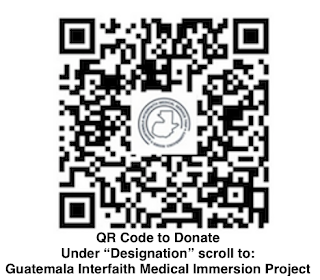The Power of Personal Stories
As the second day of clinic rolled around, everyone began to settle into their groove. We overcame the first day jitters, and not having to unpack anymore was a bonus! Even though today was a new rotation for each of us, we felt more confident starting the day. We had a better understanding of how clinic works, and we had each other’s help and advice for some of the more daunting rotations.
For me, my second day started with walking through Dr. Richard’s door and being greeted by his and Mishel’s smiles. It was an unforgettable warmth that would ease any patient’s worries. Throughout the day, it was fascinating to listen to and participate in Dr. Richard’s physical exams. From neurological exams to palpating the abdomen, there were so many signs that he could deduce and help guide him toward a diagnosis and treatment plan. But above all, the most helpful care that he provided was lending an empathetic ear to each and every one of his patients. No matter the circumstances, he explored each patient’s personal story and emphasized that during this appointment, they were the center of attention. The most impactful part of shadowing Dr. Richard was not learning a medical skill or fact but rather practicing how to sincerely listen to someone and see them as a whole individual. For some, these appointments were an infrequent occasion that could be several hours away from home, so it was crucial that we made each moment worthwhile and thorough.
Before I knew it, the afternoon had already arrived, and I was soon placed into triage. We had already practiced these skills at our mock clinic, but it still felt nerve-racking when the first patient came in. I felt a mix of anxiety and guilt for not practicing my Spanish and triage skills enough, but these worries soon melted away. Many of the patients already visited the clinic in the past, so they already knew what to do. Instead of me guiding them through their vitals, they held out their arms and rolled up their sleeves as if they were teaching me how to perform these tasks. It was a relieving moment that gave me the confidence to help new patients through triage, such as a young boy who was waiting to see Dr. Lauri. It was cute to see him imitate the patients before him by holding out his arms, but he was scared of the thermometer. After explaining the machine to him and taking his temperature, his frightened eyes opened back up and looked surprised. Nothing had happened, and he let out a big grin as he hopped off the chair. It was a simple moment that opened the accessibility to healthcare for him and his family by demystifying some of it.
Overall, today was an opportunity to feel more comfortable by practicing my Spanish and breaking down language barriers. A large part of the latter is showing the patient through actions and body language that they are recognized and heard even if we don’t completely understand each other. This passion is something that I will incorporate into my education and career path since giving each other a little more grace could do something as great as moving mountains.
-John Nguyen





Comments
Post a Comment